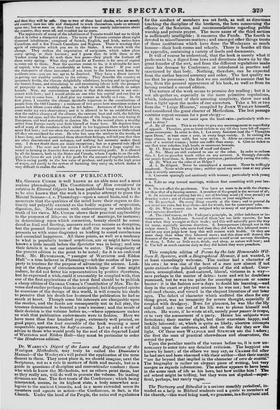Dr. WARREN'S Digest of the Laws and Regulations of the
feskyan Methodists, may truly be called the Dissenter's Manual—if the Wesleyan's will permit the application of the term dissent to them. They must place it, we should imagine, next the Scriptures, not as a rule in matters of faith and morals, but as a guide in questions of discipline and conventicular conduct : those who wish to know the Methodists, not as others paint them, but as they really are, will do well to procure the volume. Its leading divisions are four. The first treats of the Conference; which being interpreted, means, in its highest state, a body somewhat ana- logous to the ancient Councils, and in a more extended sense its members and agents in action—the Conference, in fact, is the Church. Uuder the head of the People, the rules and regulations for the conduct of members are set forth, as well as directions touching the discipline of the brethren, the laws concerning the officers of the Societies, and recommendations regarding publics worship and private prayer. The mere name of the third section is sufficiently intelligible ; it concerns the Funds. The fourth is devoted to miscellaneous matters ; and amongst other things treats of those institutions which have done the Wesleyans so much honour--their book-rooms and schools. There is besides all this an appendix, containing a variety of deeds and documents. It will Of course be understood, that the book is merely what it profeises to be, a digest from laws and directions drawn up by the great founder of' the sect, and from the different regulations made since his decease by Conference, or introduced in practice and sanctioned by that body. Nothing, therefore, can be expected from the author beyond accuracy and order. The last quality we see that lie possesses ; the first we are entitled to assume that he has, from the general appearance of his book, as well as from its having reached a second edition. The nature of the work seems to promise dry reading ; but it is not altogether so, especially in the more primitive regulations, which, independent of their amusing simplicity, throw now and then a light upon the modes of our ancestors. Take a bit or two from the " Large Minutes," compiled by JOHN WESLEY himself, and considered the great charter of Methodism. The last passage contains cogent reasons for a poor clergy— Q. 16. Should we not insist upon the band-reles—particularly with rc- gard to dress? A. By all means. This is no time to give any encouragement to superfluity of apparel. Therefore, give no band. tickets to any till they have left off super- fluous ornaments. In order to this, 1. Let every Assistant read the " Thoughts upon Dress," at least once a year, in every large society. 2. In visiting the large classes, be very mild, but very Marl. 3. Allow no exempt case, not even of a married woman ; better one suffer than many. 4. Give no ticket to any that wear calashes, high heads, or enormous bonnets.
Q. 17. Have those in band left off snuff and drams?
A. No. Many are still enslaved to one or the other. In order to redress this, I. Let no preacher touch either on any account. 2. Strongly dissuade our people from them 3. Answer their pretences; particularly curing the colic.
Q. 26. What are the rules of an Helper ?
A. I. Be diligent. Never be unemployed a moment. Never be triflingly employed. Never while away time; neither spend any more time at any place than is strictly necessary.
3. Converse sparingly and cautiously with women ; particularly with young women.
4. Take no step toward marriage, without first consulting with your bre- thren.
8. Do not affect the gentleman. You have no more to do with the charism. ter than that of a dancing-master. A preacher of the gospel is the servant of al'. 9. Be ashamed of nothing but sin ; not of fetching wood (if time permit) or drawing water ; not of cleaning your own shoes, or your neighbour's. 10. Be punctual. Do every thing exactly at the time ; and in general do not mend our rules, but keep them—not for wrath, but for conscience' sake.
Q. 28. What reasons can be assigned why so many of our preachers con- tract nervous disorders?
A. The chief reason, on Dr. Cadogan's principle, is, either indolence or in- temperance. 1. Indolence. Several of them "'use too little exercise, far less than when they wrought at their trade ; and this will naturally pave the way for many, especially nervous disorders. 2. Intemperance (though not in the vulgar sense). They take more food than they did when they laboured more: and let any man judge how long this will consist with health. Or they VE0 more sleep than when they laboured Inure; and this alone will destroy the firmness of the nerves. If then our preachers would avoid nervous disorders, let them, I. Take as little meat, drink, and sleep, as nature will bear ; and 2. Use full as much exercise daily as they did before they were preachers.


























 Previous page
Previous page